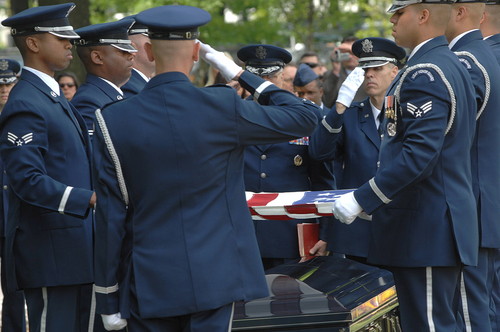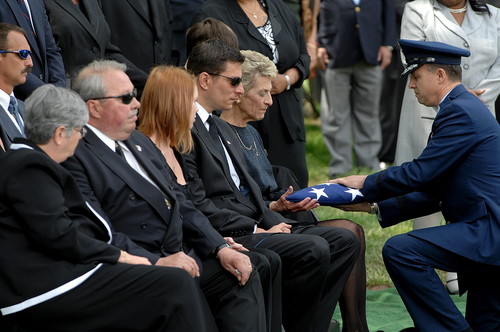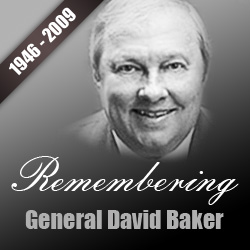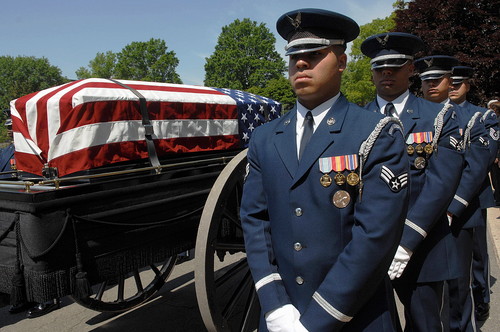Courtesy of the United States Air Force
BRIGADIER GENERAL DAVID E. BAKER
Retired October 1, 1997. Died January 29, 2009
Brigadier General David E. Baker was Vice Director, Operational Plans and Interoperability (J-7), the Joint Staff, Washington, D.C. He was accountable to the director in providing assistance to the chairman, Joint Chiefs of Staff, by increasing the warfighting capabilities of the combatant commands through improvements in the interoperability of the services in all aspects of joint doctrine, tactics, techniques and procedures. In addition, he was responsible for improving and developing joint training, exercises, war planning and simulations. He was also deputy director, Joint Staff, for military education, and reports to the Director of the Joint Staff.
The General entered the Air Force and was commissioned in 1969 at Officer Training School, Lackland Air Force Base, Texas. While serving in Vietnam as a forward air controller, he was shot down by surface-to-air missiles and was interned until the conclusion of the war in 1973. He was the only Air Force prisoner to be repatriated from Cambodia.
He was an initial cadre instructor in the F-15E and served as deputy commander for operations at a composite fighter wing during Operation Desert Storm. Prior to assuming his current position, he served as director, operations, plans and programs, Air National Guard, Washington, D.C.
EDUCATION
1968 Bachelor of business administration degree, Hofstra University, New York
1974 Squadron Officer School
1974 Master of business administration degree in human resource management, University of Hawaii (Beta Gamma Sigma)
1978 Air Command and Staff College
1983 Armed Forces Staff College
1987 Air War College
1992 National Defense College of Canada, Kingston, Ontario, Canada
1994 CAPSTONE, National Defense University, Washington, D.C.
ASSIGNMENTS
1. June 1969 – June 1970, student, pilot training, Webb Air Force Base, Texas
2. June 1970 – October 1971, EC-121 pilot, Detachment 1, 552nd Airborne Early Control Wing, McCoy Air Force Base, Florida
3. October 1971 – January 1972, AT-33 combat crew training, Cannon Air Force Base, New Mexico
4. January 1972 – February 1973, O-2A forward air controller, 21st Tactical Air Support Squadron, Tan Son Nhut Air Base, South Vietnam
5. August 1973 – September 1974, student, Air Force Institute of Technology, University of Hawaii, Honolulu
6. September 1974 – September 1979, T-38 instructor pilot, 97th Flying Training Squadron; later, flight commander, assistant section commander, chief of standardization and evaluation, 82nd Flying Training Wing, Williams Air Force Base, Arizona
7. September 1979 – January 1983, F-15 fighter pilot; later assistant operations officer, chief, F-15 standardization and evaluation, 32nd Tactical Fighter Squadron, Camp New Amsterdam, Netherlands
8. January 1983 – July 1983, student, Armed Forces Staff College, Norfolk, Virginia
9. July 1983 – December 1986, international program manager, Africa; later chief, international programs, Egypt, Headquarters U.S. Air Force, Washington, D.C.
10. December 1986 – January 1991, F-15 instructor pilot; later assistant deputy commander for operations, 405th Tactical Training Wing, Luke Air Force Base, Arizona
11. January 1991 – August 1991, deputy commander for operations, 4th Tactical Fighter Wing (Provisional) and 4404th Tactical Fighter Wing (Provisional), Al Kharj, Saudi Arabia
12. August 1991 – August 1992, student, National Defense College of Canada, Kingston, Ontario, Canada
13. August 1992 – September 1994, director, operations, plans and programs, Air National Guard, National Guard Bureau, Headquarters U.S. Air Force, Washington, D.C.
14. October 1994 – present, vice director, operational plans and interoperability directorate (J-7), the Joint Staff, Washington, D.C.
FLIGHT INFORMATION
Rating: Command pilot
Flight hours: More than 4,000
Aircraft flown: EC-121, AT-33, O-2A, T-38 and F-15 A/C/E
MAJOR AWARDS AND DECORATIONS
Legion of Merit
Distinguished Flying Cross with oak leaf cluster
Bronze Star Medal with “V” device and oak leaf cluster
Purple Heart
Meritorious Service Medal with three oak leaf clusters
Army Commendation Medal
Air Medal with four oak leaf clusters
Prisoner of War Medal
Vietnam Service Medal with two service stars
Southwest Asia Service Medal with two service stars
Republic of Vietnam Gallantry Cross with bronze star
Kuwait Liberation Medal
EFFECTIVE DATES OF PROMOTION
Second Lieutenant May 15, 1969
First Lieutenant Oct 15, 1970
Captain May 15, 1972
Major Oct 10, 1979
Lieutenant Colonel Feb 1, 1985
Colonel Dec 1, 1990
Brigadier General Oct 1, 1994
Stanford Financial Group – Washington, D.C. – February 3, 2009: The Stanford Financial Group was saddened to learn that Brigadier General (Retired) David “Bull” Baker, decorated United States Air Force veteran and Director of National Security Research in Stanford’s Policy Research Group, passed away on Friday, January 30. General Baker was 62.
A leader in cutting-edge technology and aerospace/defense issues, General Baker specialized in the aerospace and defense sector, geopolitical impacts on financial markets, technology, as it relates to global information operations for commercial and military purposes, cyber-terrorism, and National Security policy and strategy. Gen. Baker joined the policy research team in 1997 following a distinguished 29 year career with the U.S. Air Force (U.S.A.F). During the Vietnam conflict, Baker served as a forward air controller in an O-2 aircraft, courageously flying at low altitude over the jungle, marking targets for other fighters and bombers. In the spring of 1972, during his 50th combat mission, Gen. Baker was shot down over Cambodia and held as a prisoner of war in several Cambodian prison camps. During his captivity, he was shot twice while trying to escape.
Upon his release in 1973, Gen. Baker reenlisted in the U.S.A.F. and made history by being the only repatriated Air Force serviceman from the Vietnam War to fly combat missions in Operation Desert Storm. He is a recipient of the Defense Superior Service Medal, the Legion of Merit, two Distinguished Flying Crosses, and two Bronze Stars with “V” for Valor.
“David Baker was an inspiration to all of our company’s employees and his contributions will be deeply missed,” said Sir Allen Stanford, Chairman and CEO, Stanford Financial Group. “On behalf of the entire company, we extend our thoughts and condolences to his family.”
Added Edward Garlich, Managing Director, Stanford Policy Research: “For the last 11 years, David was an invaluable member of the policy research team who provided superior analysis and perspective to clients.”
In addition to his exceptional military career, General Baker graduated from Hofstra University with a BBA, later receiving an MBA from the University of Hawaii (Beta Gamma Sigma). He was a 1996 graduate of the Johns Hopkins School of Advanced International Studies and also an alumnus of the College De La Defense Nationale in Canada, the Defense Institute for Security Assistance Management and the Air War College.
General Baker is survived by his wife of 40 years, Carol, and two sons, David, Jr. and Christopher.
Photo of POW, toddler son in 1973 homecoming recalled
By Matthew Chayes
Courtesy of Newsday
April 11, 2009
On March 16, 1973, Air Force Captain David Baker stepped off a plane at Kennedy Airport and was greeted by his wife, Carol, and their son David Jr., who was 2. Baker had been a prisoner of war in Cambodia and was on his way home to Huntington, New York. Newsday photographer Bill Senft snapped a picture of Baker and his son walking down a hallway at the Eastern Airlines terminal.
“I was at the airport for an assignment,” said Senft, who is retired and living in Florida. “The boy hugged and kissed his father. It was a very joyous moment. They began walking down the hallway and I was behind them and the boy looked up at his father and said, ‘Are you really my dad?' “
Baker, who was born in Huntington and graduated from Hofstra University, later retired from the Air Force as brigadier general. He died in Maryland Jan. 29 at age 62.
Baker will be buried May 13, 2009, at Arlington National Cemetery, and Senft's picture will be the center of a collage commemorating his life, said his widow, Carol Baker.
David Baker Jr. went on to join the Air Force ROTC at Arizona State University. “I kind of just grew up always thinking I was going to go into the Air Force,” he said last month.
With the specter of defense budget cuts in the early 1990s and the small odds of becoming an Air Force pilot, Baker left the ROTC after about two years. Now 38, Baker is a financial planner for Charles Schwab in Bethesda, Maryland, and he has a daughter, Emily, 6.
The elder Baker is also survived by son Christopher, 30, of Beltsville, Maryland.
Gen. David Baker dies at 62
By Bill Gertz
Saturday, January 31, 2009
Courtesy of the Washington Times
Retired Air Force Brigadier General David E. Baker, a combat fighter pilot and former Vietnam War prisoner of war, died Thursday of congestive heart failure. He was 62.
General Baker, called “Bull” by fellow fighter pilots because of his aggressive flying style, was a forward air controller during the Vietnam War whose aircraft was shot down by a missile while flying over Cambodia in June 1972. He is the only prisoner of war repatriated from that war who went on to carry out 20 fighter missions over Baghdad as an F-15 pilot during the Persian Gulf War.
“He was a hero who fought in two wars and a leader in the Air Force who went on to have a tremendous career in the investment community,” said Edward Garlich, director of the Stanford Policy Research Group who worked with General Baker in Washington. “He will be sorely missed.”
General Baker was born in Huntington, New York, and began his career in the Air Force in 1969 after graduating from Hofstra University.
He was deployed to then-South Vietnam in January 1972 and was taken prisoner June 27, 1972, after his Cessna O-2A aircraft was shot down. He spent the next eight months as a prisoner of the Viet Cong in Cambodia until his release February 12, 1973.
During the ordeal, he was wounded trying to escape after he stole a rifle and shot several of his captors. He is the only Air Force prisoner repatriated from Cambodia after the war ended.
Complications from the leg wound lingered for years and led to his hospitalization at Walter Reed Army Medical Center several months ago.
General Baker told associates he was lucky to be returned from captivity alive and was the first Air Force POW to be released by the Viet Cong. The release from captivity is “something I will always be proud to remember for the rest of my life,” he once told former POW returnees.
After the war, General Baker became an F-15 fighter pilot and held positions with the Air Force in the Netherlands, Africa and Egypt.
In 1991, he was deployed as Deputy Commander of the 4th Tactical Fighter Wing at Al Kharj, Saudi Arabia. He flew 20 combat missions during the Gulf War.
In 1994, he worked in the Pentagon as Vice Director of Operational Plans and Interoperability on the Joint Staff. He retired in 1997 and became a financial adviser and consultant to investors.
His numerous awards and medals include the Legion of Merit, Distinguished Flying Cross with oak leaf cluster, Bronze Star Medal with “V” device and oak leaf cluster, and Purple Heart.
He is survived by his wife Carol, his sons David Jr. and Christopher, and a twin brother, retired Rear Admiral Stephen Baker.
General Baker composed a poem while in Viet Cong captivity that he wrote down after his release, which thanked God for keeping the camp's seven men alive despite Communist brutality. It concluded by imagining the day they would be freed:
“We will be a little older, but much more wise,
And I don't mean from listening to Communist lies.
If there is one thing upon which seven men can agree.
That one thing is: Freedom is not free!”
BY MARTIN C. EVANS
[email protected]
Courtesy of Newsday
13 May 2009
In 1972, a wounded U.S. Air Force pilot named David Baker was wheeled into a Viet Cong prisoner of war camp in the jungles of Cambodia, badly wounded and awkwardly bundled in a makeshift bicycle litter.
His six fellow American POWs in the camp didn't give the 25-year-old Huntington resident much chance to live. A bullet had nicked a major artery in his leg. A U.S. medic who was a prisoner at the camp concluded that a blow to the injured limb could cause a fatal hemorrhage.
But survive he did, long enough to see freedom again. Long enough to see his kids grow up.
Yesterday, the five surviving Americans who had been held prisoner with Baker, including one who flew half way around the world to be there, assembled at Arlington National Cemetery for the funeral of their POW comrade.
“A man who would not die in 1972, where we would have had to bury him in a POW camp, has died,” said the former medic, retired Army Captain Mark Smith, who lives in Bangkok. “When you have prayed for someone like that, when you've loved someone like that, then when they do die, you come.”
Smith was among more than 200 people who, along with Baker's wife, Carol, and sons, David Jr., 38, and Christopher, 30, followed the horse-drawn caisson that bore Baker's flag-draped coffin through Arlington's tree-shaded rolling hills, where Baker was laid to rest.
The military honors awarded him included a “missing man formation” flown by F-15 jets. F-15 fighters had been Baker's favorite military planes, and the formation's four jets appeared suddenly, shattering the quiet of the Virginia spring afternoon, before one streaked upward into a cloud-studded sky.
Baker, – who survived eight months of captivity before being freed in a prisoner exchange, then resumed a military career that took him to the upper rungs of the Air Force before he retired in 1997 as a brigadier general – died at 62 on January 29, 2009, of heart failure at Walter Reed Army Medical Center in Washington.
His son David Jr. said his father had battled circulatory problems related to the gunshot wound for the rest of his life.
During the funeral, held at Arlington's Old Post Chapel, retired Major General Donald Shepperd eulogized Baker as “a good husband, father, brother and friend,” whose toughness allowed him to survive a year of harsh interrogation by the Viet Cong, then return home to his family and military career.
Baker Jr. had been so young when Baker was shot down over Cambodia on June 17, 1972, that he did not recognize his father when the two were reunited at Kennedy Airport eight months later.
Baker said his father did all he could to re-bond with his family, and resumed a military career that saw him become the only Vietnam-era POW to fly missions over Iraq during the Gulf War. Shepperd said one of the most enduring images of the Gulf War – the burned-out Iraqi tanks and other military vehicles that littered the road leading back to Baghdad – had been created by the deadly handiwork of fighter pilots flying under Baker's command.
Baker went on to serve in the Pentagon as a vice director of operational plans to the Joint Chiefs. “I think all of us were very proud of Dave's success in the military,” Smith said.


Michael Robert Patterson was born in Arlington and is the son of a former officer of the US Army. So it was no wonder that sooner or later his interests drew him to American history and especially to American military history. Many of his articles can be found on renowned portals like the New York Times, Washingtonpost or Wikipedia.
Reviewed by: Michael Howard


